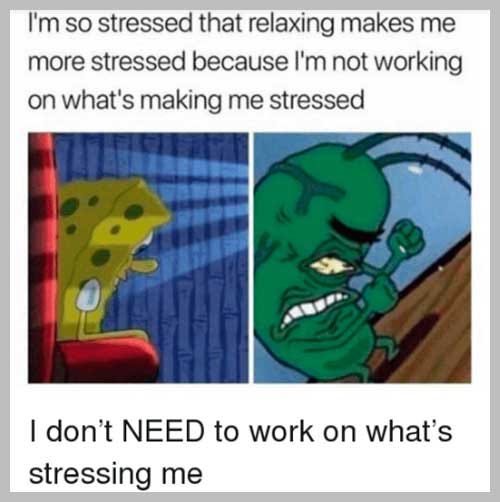I Hate Productivity
Deconstructing our slavery towards productivity
In today’s society, everyone is deeply anxious about being “productive”

There are countless books dedicated to “Getting Things Done” and optimizing productivity: wake up early, have a routine, set a schedule, get rid of distractions, work work work work work work work until you are exhausted by the end of the day and you give out onto your bed —just to wake up early and start the process all over again.

Hyper-productivity, debilitating depression, and a university system that supported it
Me and my friends from college used to idolize anyone who can be “super productive,” overcoming purported “laziness” and being superhuman. I aspired towards that self-deprecating super-productivity. Especially college during the Spring and Summertime, unbeknownst to me I would enter Manic Kevin mode. I would be hyper productive, waking up at dawn and working myself into 12am.

However, depression would crash into me like a train, shattering my precarious glass tower of productivity. I would try to pick up the broken pieces as I was spiraling down into depression, not realizing I was just shoving pieces of glass into my heart.

My most recent manic episode —April through August— I was a circus acrobat, balancing a million things at once. I juggled 5 jobs this summer while simultaneously going back and forth between Temecula and Los Angeles weekly I was 1) substitute teaching in Temecula, 2) dishwashing at The Park’s Finest, 3) freelance college academic career advising, 4) freelance tutoring, and 5) data science consultancy, working straight from 6am to 1am every day

And being manic, I thought I could do it all... until I could not.
I was not sleeping
For four months, my untreated Bipolar disorder (and then being prescribed the wrong medicine) left me with 3 to 4 hours of sleep a night. But the minute I would wake up I would be in productivity overdrive, super high-functioning until I got on the road. Driving was a battle Every. Freaking Day.

Anytime I would drive longer than 30 minutes my body would micro-nap. When I would get onto the road, on the freeway, or in traffic I would begin to nod my head in and out of my conscious reality —sleeping for seconds at a time before swerving in and out of danger. But outside the car, I had boundless energy to be productive. Within the past 4 months before my hospitalization in August, I had 4 car accidents —2 with my dad’s car and 2 with my new car— with countless close calls. I literally almost killed multiple families, drivers, and myself, culminating in a 72 hour forced hospitalization to get me some sleep and the right meds to treat my bipolar disorder.

Being manic means being “relentlessly optimistic” which leads to reckless impulsivity. People with Bipolar like me have a lower life expectancy because we tend to feel irresponsibly invincible when we are manic and horribly suicidal when we are depressed.
But in college, my mania and depression did not look like bipolar disorder.

It looked like Kevin was being a superhero. It looked like Kevin had the capacity to balance it all. Not sleeping or eating in school was not considered a symptom of my disorder —it looked like relentless hyper-productivity. I was the paragon of productivity. People wanted to produce like me. To socialize like me. To not sleep or eat like me.

But in my depression, I was barely living
By October, As the Resident Assistant for the Pilipin@ Floor , I was the opposite of manic: horribly depressed. I was sleeping all day, on YouTube all day, sad, tired, and alone/isolated all day, not showering, eating a shit ton from the dining hall downstairs, filling in the same plastic cups I would drink from with my piss and leaving them in my trashcan because I could not stomach going outside into the world in my depressed state.

“People don’t want to see depressed Kevin. They like productive Kevin. Depressed Kevin is a drag. Why aren’t you productive. Why are you so lazy. Why can’t you get up. People don’t wanna be around you.”

Thoughts like this would play on loop because the truth was I hated myself, and I projected that on other people. “People would not know how to be around Depressed Kevin. They only liked, adored, and loved Manic Kevin“ —or so I thought.

It was the social construct of productivity that exacerbated my depression
Being sad and having a low mood is a normal feature of life, but add unhealthy thought mechanisms —like succumbing to the idea that my self-worth was tied to what I could produce, what I could accomplish, and what typical milestones I could achieve— and the depression exponentially became debilitating and almost deadly. There were times where I would rather just die than be alive. I wished God would just take my life away. I would look down my window from Hedrick 5 South, bong in one hand wishing the window would open a little more so I could just throw myself off and pray that 5 stories was high enough to kill me and not injure me.

Productivity (and untreated bipolar-i disorder) was killing me
After graduating, having another depressive episode in the Philippines, and finally getting diagnosed, I realized my truth: productivity was productively killing me. While I was being “productive”, I was killing my soul. It did not take that long for me to deconstruct the idea of productivity. In the recent months, I assessed how sad trying to be productive was making me. Getting diagnosed with bipolar-i was a gift that forced me to confront the totality of my sadness and assess the roots. Nowadays, I don’t focus on whether or not I am productive that day. Rather than wake up and go on auto-pilot productive mode, I ask myself, “What does Kevin need to nurture today?”
Choose daily what you need to nurture. Mind? Body? Spirit?
Now, instead of asking myself what I need to produce, I ask myself what I need to nurture. Do I need to nurture my career (which inherently will result in “productivity”) or do I need to nurture my health? How much should I nurture my relationships, or maybe I need to nurture my heart and be alone. Do I need to think “logically” or should I access the natural supernatural power of the. universe.
Reframing my life with regard to what feels nurturing rather than what feels productive has made all the difference. Instead of feeling bad when I don’t want to be productive, I realize that there’s just something else I would rather do than work all day. And that unattachment from my work and achievements has made me a happier person.
Let us learn from the best —lessons from Issac Newton
Issac Newton, one of the greatest scientists of days of old, made the startling discovery of gravity. Legend has it that the famous Issac Newton discovered gravity when he was sitting at the trunk of an apple tree, enjoying his time with himself observing the natural world. He saw a falling apple and began to think about the force of nature that pulled the apple to the ground: gravity. In the quiet solitude he was blessed with the inspiration that led to a discovery that which changed the landscape of science forever, all while being unproductive underneath an apple tree. So tell me, was he being “productive” when he made the discovery?

How to help you help yourself deconstruct productivity:
Allow yourself to slow down: people say its hard to be productive in college. I call bullshit. I say it is harder to do absolutely nothing at all and just sit in your aloneness and silence and think about yourself. Try doing that for month. A day. An hour. Try to be still for even 5 minutes. Hard, right?
Deconstruct the rat race— it does not exist: graduated by 22, full-time bustling career by 25, married by 30, kids by 50, diseased by 60, and dead by 70. The so-called Filipino American Dream. Guess what, it does not exist. The rat race of milestones that we compare ourselves to is destructive. Attachments towards ideas like “I have to be this by this certain age or else I am worthless” is toxic.
Show compassion when you are unproductive and lazy: instead of calling yourself lazy and hating yourself, try accepting the way that you are. Maybe there’s a reason you don’t want to be productive. When you take yourself out of that which is stressing you to be productive, your subconscious will still be working on it in the background.
Discover your why in nature, other, and —most importantly— yourself: the most “productive” thing we can do for ourselves is discover the story of why we are here and what we are manifesting. In Tagalog it is called talambuhay—your own personal storytelling. When you find your why, your higher purpose, your true north, whatever you call it, you access a supernatural superpower that transcends productivity for productivity’s sake.
Those are some lessons that I have learned from my bipolar-i. And nowadays, I am what people would call “hella productive,” because now, there is no such thing as lazy. If I’m not productive, I don’t beat myself up. I let myself drop what I am doing and move on to what I actually want to do. And I’m happier because of it. I am selfish for my silence. I crave nothingness. I sit down underneath a tree with my dog and think about my life and existence. And like Issac Newton, inspiration blesses me with tidbits of truth. I feel Nirvana course through my brain instead of anxiety because I’ve allowed myself to slow down and let go of everything the world tells me I’m supposed to be or produce. I discover my why more and more each day. Call it coping, call it failure, but I call it purpose.
But what do I know... I’m just a substitute teacher...
;)
Subscribe to The Activist Cookbook for more recipes on having a more fullfilled, balanced life. What ways has productivity affected your life? Join The Activist Cookbook’s official Discord Server: The Kabayanihan (the fellow community moving forward) and let’s chat there!
